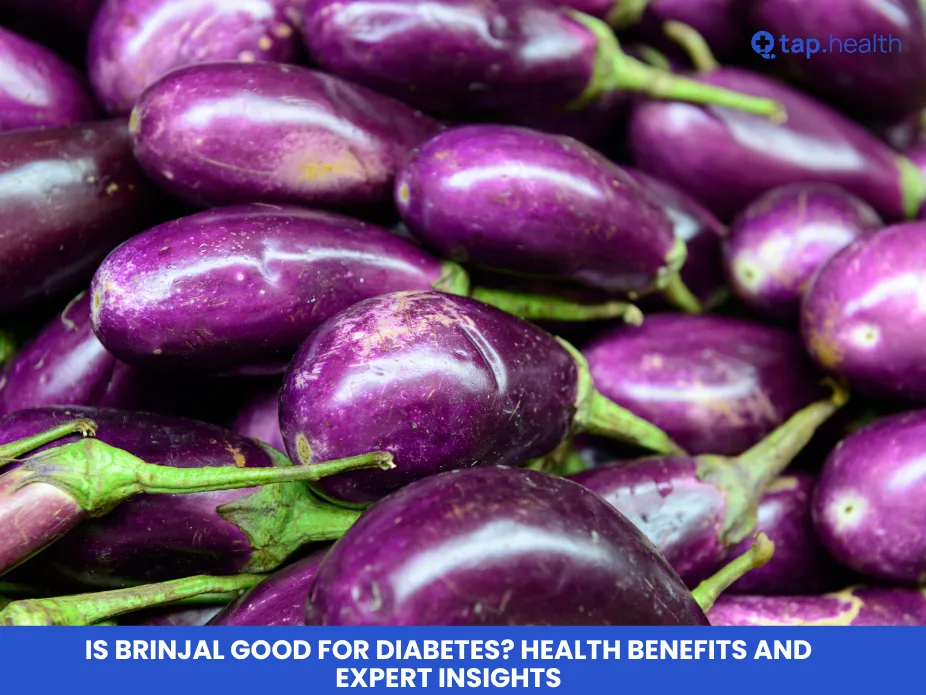Yes, brinjal, commonly known as eggplant, is highly beneficial for people with diabetes. Its low glycemic index, minimal carbohydrate content, and high dietary fiber make it an ideal vegetable for blood sugar control.
Nutritional Profile of Brinjal for Diabetes Management
Brinjal stands out due to its diabetes-friendly nutrition:
- Very low in calories and carbohydrates (only 5–6g carbs per 100g)
- High in soluble and insoluble fiber that slows glucose absorption
- Glycemic Index (GI) of just 15–20 – among the lowest for vegetables
- Rich in anthocyanins, nasunin, chlorogenic acid – powerful antioxidants with anti-diabetic properties
- Good source of potassium, magnesium, vitamin C, B6 and folate
These nutrients collectively support stable blood glucose, better insulin sensitivity and reduced inflammation.
How Brinjal Helps Control Blood Sugar Levels
- Low Carb + High Fiber = No Sugar Spikes The fiber in brinjal forms a gel in the stomach, delaying sugar release into the bloodstream.
- Improves Insulin Sensitivity Soluble fiber and polyphenols enhance the body’s response to insulin, especially helpful in Type 2 diabetes.
- Reduces Oxidative Stress & Inflammation Nasunin and anthocyanins in the purple skin protect cells from damage and lower chronic inflammation linked to insulin resistance.
- Supports Heart Health Potassium and antioxidants help manage blood pressure and cholesterol – common concerns in diabetes.
Scientific Evidence & Research on Brinjal and Diabetes
- A 2013 study (International Journal of Food Sciences and Nutrition) showed eggplant extract significantly reduced fasting blood glucose in diabetic rats.
- 2014 research (Journal of Diabetes & Metabolic Disorders) confirmed antioxidant-rich foods like brinjal decrease oxidative stress and cardiovascular risk in diabetics.
- Multiple animal and lab studies indicate chlorogenic acid in brinjal inhibits glucose-producing enzymes in the liver.
Though large human trials are still ongoing, existing evidence strongly supports including brinjal in a diabetic diet.
Best Ways to Cook Brinjal for Diabetics
Avoid deep-frying (like baingan bharta with excess oil or vada). Instead choose:
- Roasted or grilled brinjal with minimal olive oil
- Baked eggplant slices with herbs
- Lightly sautéed or steamed in stir-fries
- Added to vegetable curries without sugar or creamy gravy
- Made into baba ganoush or ratatouille (Mediterranean style)
Keep the skin on – that’s where most antioxidants are found.
Who Should Be Cautious?
People with nightshade sensitivity, arthritis, or IBS may experience discomfort. Start with small portions and monitor symptoms.
Expert Opinion on Brinjal for Diabetes
Renowned nutritionist Dr. Rima Khanna says: “Brinjal is one of the safest and most effective vegetables for both Type 1 and Type 2 diabetes. Its low GI and high fiber prevent glucose spikes, while nasunin helps fight inflammation and insulin resistance. I recommend 2–3 servings of non-starchy vegetables daily, and brinjal should definitely be one of them.”
Quick FAQ – Brinjal and Diabetes
Q. Can diabetics eat brinjal daily?
A. Yes, 1–2 cups cooked brinjal daily is completely safe and beneficial.
Q. Does brinjal reduce blood sugar instantly?
A. It doesn’t drop sugar instantly but helps maintain steady levels when eaten regularly.
Q. Is fried brinjal bad for diabetes?
A. Yes, deep-fried versions add unhealthy fats and calories – avoid them.
Q. Which color brinjal is best for diabetes?
A. Purple brinjal has the highest anthocyanin content, followed by white and green varieties.
Is Brinjal Good for Diabetes According to TapHealth?
According to TapHealth’s latest diabetes nutrition guidelines, brinjal ranks as a “super vegetable” for diabetic patients because of its ultra-low glycemic load, exceptional fiber-to-carb ratio, and proven antioxidant benefits. TapHealth strongly recommends including brinjal regularly in meal plans for better glycemic control and long-term complication prevention.



